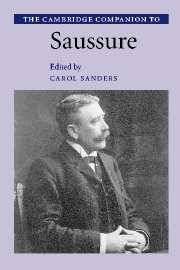Book contents
- Frontmatter
- Introduction: Saussure today
- Part I Out of the nineteenth century
- Part II The ‘Course in General Linguistics’
- Part III After the Cours
- Part IV New debates and directions
- 13 Saussure’s unfinished semantics
- 14 Saussure, linguistic theory and philosophy of science
- 15 Saussure’s legacy in semiotics
- Notes
- Works by Saussure and further reading
- References
- Index
13 - Saussure’s unfinished semantics
from Part IV - New debates and directions
Published online by Cambridge University Press: 28 May 2006
- Frontmatter
- Introduction: Saussure today
- Part I Out of the nineteenth century
- Part II The ‘Course in General Linguistics’
- Part III After the Cours
- Part IV New debates and directions
- 13 Saussure’s unfinished semantics
- 14 Saussure, linguistic theory and philosophy of science
- 15 Saussure’s legacy in semiotics
- Notes
- Works by Saussure and further reading
- References
- Index
Summary
Saussure as pragmatician?
Saussure's position with respect to meaning cannot be discussed without an in-depth analysis of the original texts, that is the students' notes from the lectures on general linguistics and writings by Saussure himself on general linguistics. While it is impossible to take the Cours as a literal basis for a semantics structured around a maximal ('textual') theory of meaning, which I shall call a semiotics of interpretation, such a structure can be deduced by looking at the original texts. The (re)reading of Saussure presented in this chapter points up not only the way Saussure's approach to semantics has gone largely unnoticed (in its production), but also the importance for Saussure's thought of the 'action value' of language - in other words, the central importance of the interpretative point of view. Having said that, his lectures and writings do not contain a developed theory of articulation from a 'grammatical' and an interpretative viewpoint - in other words, if one adopts my definition of the word meaning, there is no theory of meaning. But there are extremely clear suggestions – censored, forgotten or ignored in the Cours – which point the way towards such a theory.
- Type
- Chapter
- Information
- The Cambridge Companion to Saussure , pp. 205 - 218Publisher: Cambridge University PressPrint publication year: 2004
- 5
- Cited by

